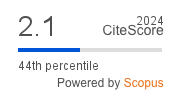Indian Budget 2022: A Make-or-Break Moment for Cryptocurrency
DOI:
https://doi.org/10.4108/eetiot.4540Keywords:
Crytpocurrency, Digital Economy, Digital Currency, Tax, Indian Budget 2022, Digital Leaders, Indian GovernmentAbstract
People are liable to the tax rate if they transfer digital assets during a specific fiscal year. There is no distinction between income from businesses and investments or between short-term and long-term gains because the 30% tax rate is applicable regardless of the sort of income. By clearly stating how it would be charged, the Indian budget 2022 has provided some direction. Losses were consequently experienced by both new and old cryptocurrency buyers. Under Section 115 BBH, it is illegal to offset cryptocurrency losses with cryptocurrency gains—or any other gains or revenue, for that matter. The implementation of the 30% tax rule on digital assets has caused the collapse of the cryptocurrency market, and there is a possibility that investors will continue to suffer losses in the future.
Downloads
References
Minutolo, M. C., Werner, K., & Prakash, D. (2022). Impact of COVID-19 effective reproductive rate on cryptocurrency. Financial Innovation, 8(1) doi:https://doi.org/10.1186/s40854-022-00354-5
Aliyev, A. G. (2022). Study of development trends and application risks of cryptocurrency and blockchain technologies in the digital environment. Informatica Economica, 26(3), 37-49. doi:https://doi.org/10.24818/issn14531305/26.3.2022.04
Reeves, L. (2022). India’s crypto tax policy lacks ‘nuance’. International Tax Review, https://www.proquest.com/scholarly-journals/india-s-crypto-tax-policy-lacks-nuance/docview/2643856257/se-2
Sundaravelu, A. (2021). Foreign cryptocurrency exchanges in India may take 18% tax hit. InternationalTax Review, https://www.proquest.com/scholarly-journals/foreign-cryptocurrency-exchanges-india-may-take/docview/2571798964/se-2
Prof. Satyajitsinh Gohil, Pallavi Jain, Subarnasankar Ganguly (2022). Perception of People in Crypto Trading after Taxation Policy Changes, Vol 3, no 3, pp 120-126, https://ijrpr.com/uploads/V3ISSUE3/ijrpr2847-perception-of-people-in-crypto-trading-after-taxation-policy-changes.pdf
Varun Shukla, Manoj Kumar Misra, Atul Chaturvedi Pranveer Singh Institute of Technology,Kanpur,India,https://www.researchgate.net/publication/359436045_Journey_of_Cryptocurrency_in_India_In_View_of_Financial_Budget_2022-23
Naved, N. (2020). Virtual currencies in india: Analyzing the Reserve bank of India's big "ban" theory. Banking & Finance Law Review, 36(1), 145-154. https://www.proquest.com/scholarly-journals/virtual-currencies-india-analyzing-reserve-bank/docview/2472332947/se-2
G. P. Rout and S. N. Mohanty, "A Hybrid Approach for Network Intrusion Detection," 2015 Fifth International Conference on Communication Systems and Network Technologies, Gwalior, India, 2015, pp. 614-617, doi: 10.1109/CSNT.2015.76.
Alenezi, F.; Armghan, A.; Mohanty, S.N.; Jhaveri, R.H.; Tiwari, P. Block-Greedy and CNN Based Underwater Image Dehazing for Novel Depth Estimation and Optimal Ambient Light. Water 2021, 13, 3470. https://doi.org/10.3390/w13233470
Ghosh, H., Tusher, M.A., Rahat, I.S., Khasim, S., Mohanty, S.N. (2023). Water Quality Assessment Through Predictive Machine Learning. In: Intelligent Computing and Networking. IC-ICN 2023. Lecture Notes in Networks and Systems, vol 699. Springer, Singapore. https://doi.org/10.1007/978-981-99-3177-4_6
Downloads
Published
Issue
Section
License
Copyright (c) 2023 EAI Endorsed Transactions on Internet of Things

This work is licensed under a Creative Commons Attribution 3.0 Unported License.
This is an open-access article distributed under the terms of the Creative Commons Attribution CC BY 4.0 license, which permits unlimited use, distribution, and reproduction in any medium so long as the original work is properly cited.




